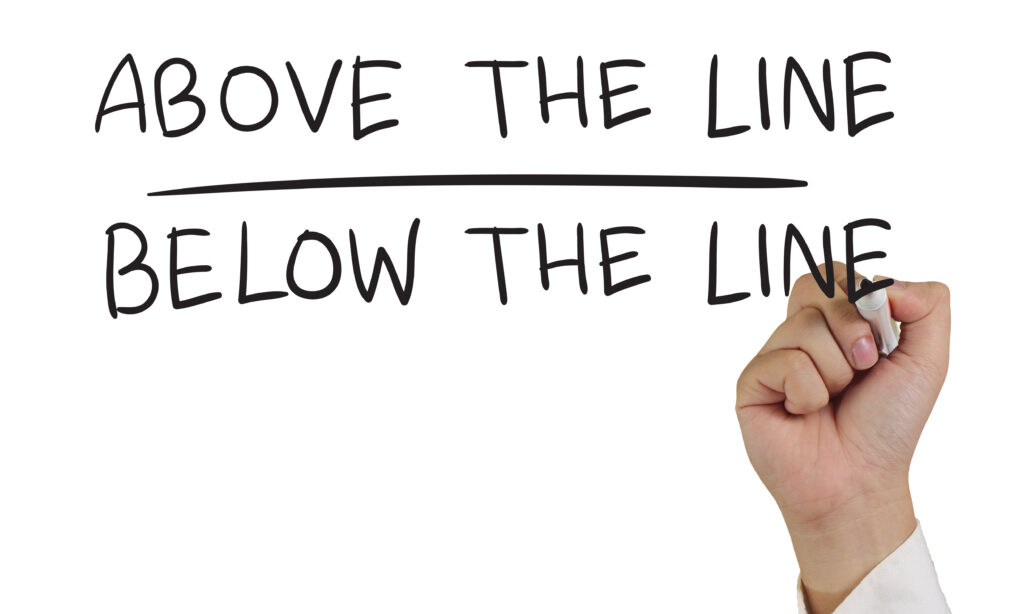There is an unmistakable feeling of busyness out there in the workplace at the moment. Workers, leaders and teams feeling like they have never been so busy, but even with all of this activity, sometimes struggling to have an impact.
My friend Matt Church put me onto a book a couple of years ago called The 15 Commitments of Conscious Leadership by Jim Dethmer, Diana Chapman and Kaley Warner Klemp. One of the concepts that I loved in the book was the idea of leaders either working above or below the line. This is now a concept that is widely talked about in leadership circles and is sometimes called ‘line theory’.
I think line theory has an application when it comes to our productivity. I reckon that when we are doing our day-to-day work, we are either working above the line on the things that have the most impact, or being caught below the line, working on things that make us busy, but less impactful. Our ability to stay above the line as much as possible has a direct link to the outcomes we achieve in our role. But it is not easy to stay above the line, as there are many things, many people and many forces that work against our best-laid plans, dragging us down below the line into busyness.

A part of your role, especially if you are a leader, is to monitor where you are spending your time, energy and focus, and when you catch yourself working below the line, to do something about it. Here are five strategies that you could apply to deal with work that is dragging you below the line:
Shift it – Give it away
Sometimes we allow work to land on our plate that should be done, but not by us. We need to be ruthless in delegating the tasks, or the part of the task that could or should be done by others. Delegation is a powerful but sometimes underused tool for many leaders.
Shrink it – Make it smaller
Some work needs your input but feels big and hard and time consuming. But sometimes we are the ones that make it bigger, and harder, and more time consuming than it needs to be. Rather than procrastinating about something that feels like it requires a couple of dedicated hours of your time that you do not have, could the task be made smaller, and completed in 30-minutes? Would 30-minutes of your effort be enough to deliver a ‘good enough’ outcome? Possibly. I know that I would usually prefer something that was good enough delivered before the deadline, than something perfect a week late!
Simplify it – Make it easier
Is some of the work we get caught up in just too complex? Do we have overly complex processes in our team, that again lead us to procrastinate and feel overloaded too much of the time? What could be simplified in our roles? What are the things that we often get stuck on? Doing a review of this for yourself, and for your team can be a great way to get everyone back above the line.
Suspend it – Pause it temporarily
We all have certain times of increased workload and pressure. We have major deadlines, or times of the quarter or year that demand more of our time, energy and focus. These are the times where we need to take some of the pressure off by suspending non-critical activities until our deadline has passed, or the pressure is off. I often use the first day of the month as a place to reschedule tasks that I cannot think about this month, but want to ensure do not get entirely forgotten. This is a suspend strategy.
Stop it – End it permanently
Finally, are there things that you are doing that drag you down below the line, that you should stop altogether? It is definitely worth having a long, hard look at what you are spending your time on, and asking yourself what you could stop doing. This may require some negotiation with your line manager, but there may be reports, meetings or activities that just don’t add the value that they used to, but still consume resources. Every year we should be culling old, unnecessary activities like a snake shedding its skin!
I find this idea of above and below the line a simple framework to help to keep me focused on what has most impact in my role. I try to step outside of myself at regular intervals to look at what I am spending my time, energy and focus on with an objective eye, and I regularly try to shift, shrink, simplify, suspend or stop anything that is below the line. How about you?